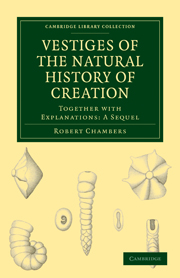Book contents
- Frontmatter
- Contents
- THE BODIES OF SPACE—THEIR ARRANGEMENTS AND FORMATION
- CONSTITUENT MATERIALS OF THE EARTH, AND OF THE OTHER BODIES OF SPACE
- THE EARTH FORMED—ERA OF THE PRIMARY ROCKS
- COMMENCEMENT OF ORGANIC LIFE—SEA PLANTS, CORALS, ETC
- ERA OF THE OLD RED SANDSTONE—FISHES ABUNDANT
- SECONDARY ROCKS—ERA OF THE CARBONIFEROUS FORMATION—COMMENCEMENT OF LAND PLANTS
- ERA OF THE NEW RED SANDSTONE—TERRESTRIAL ZOOLOGY COMMENCES WITH REPTILES—FIRST TRACES OF BIRDS
- ERA OF THE OOLITE—COMMENCEMENT OF MAMMALIA
- ERA OF THE CRETACEOUS FORMATION
- ERA OF THE TERTIARY FORMATION — MAMMALIA ABUNDANT
- ERA OF THE SUPERFICIAL FORMATIONS—COMMENCEMENT OF PRESENT SPECIES
- GENERAL CONSIDERATIONS RESPECTING THE ORIGIN OF THE ANIMATED TRIBES
- PARTICULAR CONSIDERATIONS RESPECTING THE ORIGIN OF THE ANIMATED TRIBES
- HYPOTHESIS OF THE DEVELOPMENT OF THE VEGETABLE AND ANIMAL KINGDOMS
- AFFINITIES AND GEOGRAPHICAL DISTRIBUTION OF ORGANISMS
- EARLY HISTORY OF MANKIND
- MENTAL CONSTITUTION OF ANIMALS
- PURPOSE AND GENERAL CONDITION OF THE ANIMATED CREATION
- NOTE CONCLUSORY
- APPENDIX
PURPOSE AND GENERAL CONDITION OF THE ANIMATED CREATION
Published online by Cambridge University Press: 05 August 2011
- Frontmatter
- Contents
- THE BODIES OF SPACE—THEIR ARRANGEMENTS AND FORMATION
- CONSTITUENT MATERIALS OF THE EARTH, AND OF THE OTHER BODIES OF SPACE
- THE EARTH FORMED—ERA OF THE PRIMARY ROCKS
- COMMENCEMENT OF ORGANIC LIFE—SEA PLANTS, CORALS, ETC
- ERA OF THE OLD RED SANDSTONE—FISHES ABUNDANT
- SECONDARY ROCKS—ERA OF THE CARBONIFEROUS FORMATION—COMMENCEMENT OF LAND PLANTS
- ERA OF THE NEW RED SANDSTONE—TERRESTRIAL ZOOLOGY COMMENCES WITH REPTILES—FIRST TRACES OF BIRDS
- ERA OF THE OOLITE—COMMENCEMENT OF MAMMALIA
- ERA OF THE CRETACEOUS FORMATION
- ERA OF THE TERTIARY FORMATION — MAMMALIA ABUNDANT
- ERA OF THE SUPERFICIAL FORMATIONS—COMMENCEMENT OF PRESENT SPECIES
- GENERAL CONSIDERATIONS RESPECTING THE ORIGIN OF THE ANIMATED TRIBES
- PARTICULAR CONSIDERATIONS RESPECTING THE ORIGIN OF THE ANIMATED TRIBES
- HYPOTHESIS OF THE DEVELOPMENT OF THE VEGETABLE AND ANIMAL KINGDOMS
- AFFINITIES AND GEOGRAPHICAL DISTRIBUTION OF ORGANISMS
- EARLY HISTORY OF MANKIND
- MENTAL CONSTITUTION OF ANIMALS
- PURPOSE AND GENERAL CONDITION OF THE ANIMATED CREATION
- NOTE CONCLUSORY
- APPENDIX
Summary
We have now to inquire how this view of the constitution and origin of nature bears upon the condition of man upon the earth, and his relation to supra-mundane things.
That enjoyment is the proper attendant of animal existence is pressed upon us by all that we see and all we experience. Everywhere we perceive in the lower creatures, in their ordinary condition, symptoms of enjoyment. Their whole being is a system of needs, the supplying of which is gratification, and of faculties, the exercise of which is pleasurable. When we consult our own sensations, we find that, even in a sense of a healthy performance of all the functions of the animal economy, God has furnished us with an innocent and very high enjoyment. The mere quiet consciousness of a healthy play of the mental functions—a mind at ease with itself and all around it—is in like manner extremely agreeable. This negative class of enjoyments, it may be remarked, is likely to be even more extensively experienced by the lower animals than by man, at least in the proportion of their absolute endowments, as their mental and bodily functions are much less liable to derangement than ours. To find the world constituted on this principle is only what in reason we should expect. We cannot conceive that so vast a system could have been created for a contrary purpose.
- Type
- Chapter
- Information
- Vestiges of the Natural History of CreationTogether with Explanations: A Sequel, pp. 373 - 409Publisher: Cambridge University PressPrint publication year: 2009First published in: 1844



